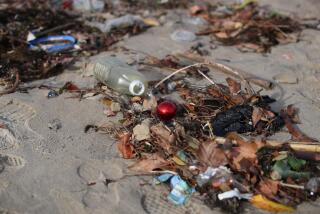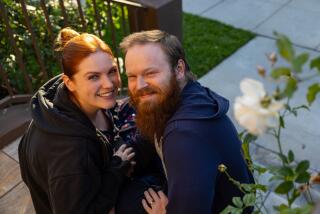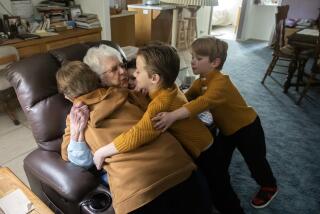For Kids Who Have Everything
- Share via
Cameron Cooper likes big birthday parties with lots of friends--and that means lots of presents. Maybe even too many presents.
So for her seventh birthday in October, the West Los Angeles girl decided to do something different. Inspired by a friend who turned her birthday party into a fund-raiser for endangered turtles, the animal-loving Cameron asked her guests not to bring presents. Instead, they were encouraged to donate to the local environmental organization Heal the Bay.
Thanks to Cameron, the nonprofit group reaped about $500 toward its efforts to clean up the Santa Monica Bay, and the second-grader came away with a sense of having done something important.
“I really like the animals in the bay, and I like the water to be clean, so that’s why I did Heal the Bay,” Cameron said.
As for not getting more dolls, games or books, she was philosophical: “I have a whole room full of toys. I don’t really need anything else.”
Cameron’s choice is unusual but not unique. Daniel Smith of Collinsville, Ill., also used a birthday as an opportunity to help others. The 8-year-old, who was born on Christmas Eve, doesn’t typically celebrate with a party. But when he turned 7, Daniel invited friends to go bowling and asked them to skip the presents and make a donation instead to help fight Parkinson’s disease, which afflicts several family members, including his grandmother.
“He said it sounded like a neat idea, and he agreed he didn’t really need any more presents,” said Daniel’s mother, Mary Kay Smith. “He agreed to this no-present party without blinking an eye,” she said, adding they have not yet decided how to mark Daniel’s latest birthday. “He was real proud of himself and really excited.” Daniel had decorated a box for guests to put the donations in.
Daniel, whose friends contributed $75 to the American Parkinson Disease Assn., knew he had made a good choice based on the response from his grandmother, Donna Kuechle. “She just came over and gave me a hug,” Daniel said.
Cameron’s and Daniel’s families and others like them are finding creative ways to challenge the assumption that birthdays and the holiday season should be gift-giving extravaganzas.
The notion is also being promoted by simple-living and anti-consumerism groups like the Maryland-based Center for a New American Dream. Since Sept. 11, there has been growing interest in making family celebrations more meaningful and less commercial, said Eric Brown, the center’s spokesman.
Birthday parties, in particular, “seem to be the bane of most parents’ existence,” Brown said. “They’re expensive. They get the kids all keyed up, and they overemphasize gift giving. Parents are trying to come up with a better way.”
The center’s Web site (www.newdream.org) offers a long list of “Tips for Raising Healthy Kids in a Commercial Culture.” One suggestion: Friends and relatives can give as a gift “several hours of time”--to be spent as the child wishes--combined with a contribution to a charity.
Parental attention may be more appreciated by children than many adults realize.
“A lot of kids say they wish they spent more time with their parents,” said Robert Butterworth, a Los Angeles-based child psychologist.
Instead of an overwhelming number of presents on a single day, Butterworth suggests that many youngsters might enjoy gifts of time in the form of coupons that they can redeem with their parents throughout the year. It’s a fun way for a child to book exclusive time with Mom or Dad for a special activity such as a movie or a game of miniature golf.
For parents like Milwaukee resident Jennifer Morales, toned-down celebrations are part of a larger project: resisting the influence of advertising and consumer culture. Her two sons, whose July birthdays are a week apart, have a joint birthday party in her backyard with friends, a wading pool and a pinata--but no costly extras like pony rides or people dressed as Disney characters.
“Because of advertising and our very materialistic culture, we always think that more is going to be better,” said Morales, a member of the Milwaukee School Board and former assistant director of the Center for the Study of Commercialism in Education.
Instead of toys, Morales encourages friends and relatives to give her boys--Anansi, 8, and Cedro, 6--experiences they will remember and treasure, such as taking a train ride together or visiting the zoo. For years, the boys’ grandparents have been taking them to see children’s plays at Christmastime as an alternative to presents.
The idea is to avoid what Brown, of the Center for a New American Dream, calls “the commercialization of childhood.”
Morales, who says growing up in suburban Chicago with little money taught her the value of thrift, finds that limiting her children’s exposure to commercials (she doesn’t own a TV) means they tend not to clamor for the latest toys. That’s not to say there’s never any grumbling from her sons--or from their friends’ parents, who sometimes don’t “get it,” Morales said.
“Once in a while I do get some complaints” from Anansi and Cedro, Morales said. “But for the most part they have come to accept that Mom has certain values and standards, and that’s just the way things are.”
Unlike Morales, Ann Boehlke was reared in relative comfort in Colorado as a doctor’s daughter. But thrift was a central value in her family, and the Venice resident tries to pass on to her three children--ages 5, 3 and 1--the benefits of doing more with less.
Boehlke, who admits to a quirky streak, likes to do things differently; at her wedding, instead of gifts, she had friends contribute pieces to her extra-long homemade wedding train.
She tries to make birthday parties simple but fun. One year she had guests bring food for a potluck; other times the family has gone to theater events with a few friends. She asks people not to bring presents, although some usually do so anyway.
Last fall, Boehlke’s oldest child, Emma Polhemus, began attending kindergarten at Edison Language Academy in Santa Monica. When Emma’s fifth birthday rolled around a few weeks later, Boehlke and her husband, Mack Polhemus, had a thought: Instead of filling up their apartment with more tchotchkes, why not take advantage of Emma’s birthday and do something to help the school by buying playground equipment?
The birthday donations helped to purchase small but useful items including a tricycle, jump ropes and some large play balls.
Boehlke is frank in her distaste for the clutter that birthdays bring, and her preference for events that foster memories rather than messes.
“I didn’t want all that junk,” she said. “You always get all this stuff you don’t need.”
Janine Jeffery, mother of Cameron, who raised money for Heal the Bay, would agree. In the past, she said, her daughter received so much stuff that “we ended up giving some of those things away.”
That won’t be a problem this year. Cameron already has chosen a charity for her eighth birthday party: Save the Whales.


